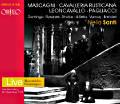ORFEO International – Reviews
Important Releases Briefly Introduced
July 2012
ORFEO 2 CD C 845 122 I
Even as recently as the 1970s it was by no means certain that the biggest German opera houses would perform the works in their repertory in their original language. 
C 845 122 IWhen well-known singers made guest appearances in mainstream operas, it was in no way exceptional for the performance to be sung in more than one language. 
Leonie Rysanek, Benito di Bella

Astrid Varnay, Plácido Domingo
Fotos: Archiv der Bayerischen StaatsoperBut this was not the case in the meticulously rehearsed first night of the two most famous one-hour Italian operas, Mascagni’s Cavalleria rusticana and Leoncavallo’s Pagliacci, which opened at the Munich National Theatre on Christmas Day 1978. Under Nello Santi’s gripping and thrilling conducting, the Bavarian State Opera’s cast was made up of a veritable galaxy of star performers: great names, but also singers able to work together as a close-knit ensemble. Singing Santuzza for the first time, Leonie Rysanek discovered a new signature role admirably suited to her expressive abilities and to a voice whose upper register was as radiant as ever. Opposite her was Plácido Domingo, who in this production essayed the leading tenor roles in both these operas: with his bronze timbre, he was quite the impulsive predator and seducer as Turiddu, while as Canio he was alarmingly impulsive in his raging fury as the cuckolded husband. Teresa Stratas and Wolfgang Brendel were likewise ideal casting as Nedda and Silvio in Pagliacci, both of them excellent at stoking the fires of jealousy. Domingo was not the only singer to appear in both works. So, too, did Benito di Bella as the carrier Alfio and as an artful Tonio. With his sturdy baritone he brought both figures to vibrant life in finely etched performances. The same is true of two singers in smaller roles, both of them tried and tested in the refining fires of Bayreuth: the legendary Astrid Varnay as Mamma Lucia and Norbert Orth, later to make a name for himself as a heldentenor, as Beppe. Giancarlo del Monaco’s production remained in the Munich repertory for decades, the spectacular success of its first night due in no small measure to the Chorus of the Bavarian State Opera, which slipped effortlessly into the roles of members of a village community in both works, investing their characters with a vivid vocal and dramatic profile. Orfeo’s live recording on CD not only documents this first night, it once again allows listeners to share in the excitement of the occasion.
top |